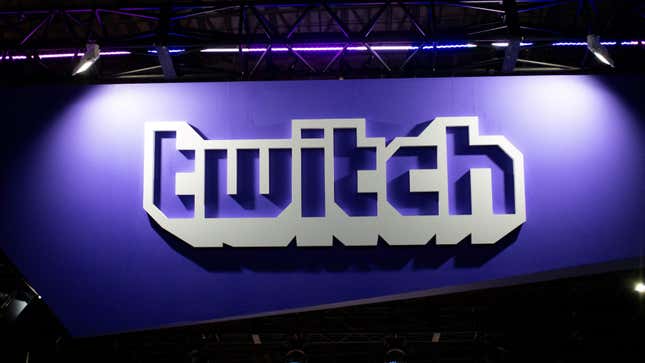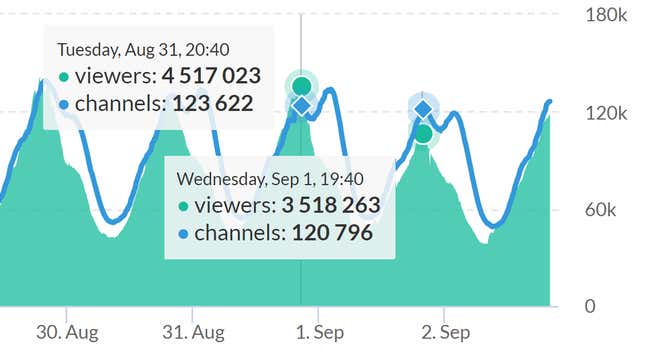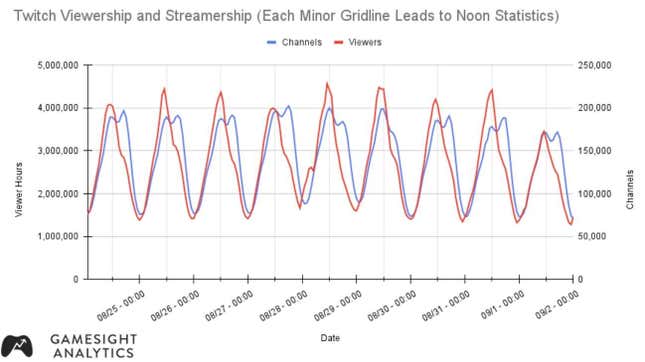
Yesterday, thousands of streamers abandoned Twitch for 24 hours in protest of its ongoing facilitation of harassment campaigns known as hate raids. While the Amazon-owned streaming platform has yet to implement proposed changes to the controversial raid system, it’s clear what some previously dismissed as a small movement has had a big impact, potentially costing Twitch roughly 22% of its peak concurrent traffic for the day.
That number comes from TwitchTracker which provides outside data on platform metrics like how many people are streaming and how many are watching. While Twitch normally peaks at 4.5 million concurrent viewers on any given day, on Wednesday it hung at about 3.5 million instead. That drop came as the number of content creators streaming on the platform dropped by over 10,000 as they rallied around the hashtag #ADayOffTwitch.
Estimates by data firm GameSight Analytics showed a drop-off from the prior Wednesday as well. According to it, there were 897,745 channels streaming last Wednesday on August 25. That resulted in 2.415 million hours streamed and 65.167 million hours viewed. Yesterday, those numbers dropped to 834,107 total channels, 2.201 million hours streamed, and 54.877 million hours viewed. That’s around 16% fewer hours of content created and consumed overall. The hashtag also trended on Twitter throughout the day with over 100,000 mentions.

“We support our streamers’ rights to express themselves and bring attention to important issues across our service,” a spokesperson for Twitch said in a statement to Eurogamer. “No one should have to experience malicious and hateful attacks based on who they are or what they stand for and we are working hard on improved channel-level ban evasion detection and additional account improvements to help make Twitch a safer place for creators.”
#ADayOffTwitch came about because of growing frustration over Twitch’s unwillingness to crackdown more strictly on harassment and bigotry on the platform. In light of a growing number of hate raids targeting marginalized streamers and streamers of color in which bots spam channels with vitriol and slurs, content creators started putting together practical guides to help victims and calling on Twitch to overhaul the raid feature.
#TwitchDoBetter, a hashtag created by streamer Rek It, Raven! built up steam throughout August around a 2018 tweet by Twitch telling people to hold it accountable. In light of the latest wave of criticism, the streaming platform rolled out improved chat filters and announced plans for a better ban evasion detection system sometime in the future. But streamers want swifter, more decisive action, which culminated in plans for a September 1 boycott organized by Raven, fellow streamers LuciaEverblack and ShineyPen, and others.

“I think we need to normalize being able to really make change on our own,” Raven told Wired following yesterday’s protest. The streamer said that at least initially, the day-long blackout and accompanying social media campaigns appear to be moving the needle. “People are talking about this all over the world. We have created a sense of solidarity. Twitch has responded and met with me.”
Social media platforms have been criticized across the board for facilitating the spread of misinformation, hate speech, and harassment, but Twitch has come under special scrutiny for how it directly profits off of content creators it’s done little to protect. The streaming platform takes a whopping 50% cut of their subscription revenue by default, a fact that rival platforms on Facebook and YouTube have tried to leverage by offering better deals in exchange for streamers jumping ship.
And in some cases it’s working. Just this week DrLupo and TimTheTatMan announced they were leaving Twitch for YouTube. Washington Post reporter Nathan Grayson noted on Twitter that so far the results have been mixed. While DrLupo has seen a slight drop-off in his average viewership, TimTheTatMan’s audience ballooned to over 100,000 concurrents for his inaugural steam on Google’s platform.
But mixed might be just enough to convince some other streamers to try their luck outside of Twitch at least the big ones with a built-in audience who can help pave alternate routes to success. And in the meantime it might help put pressure on Twitch to be more responsive to the demands of those content creators who have remained.